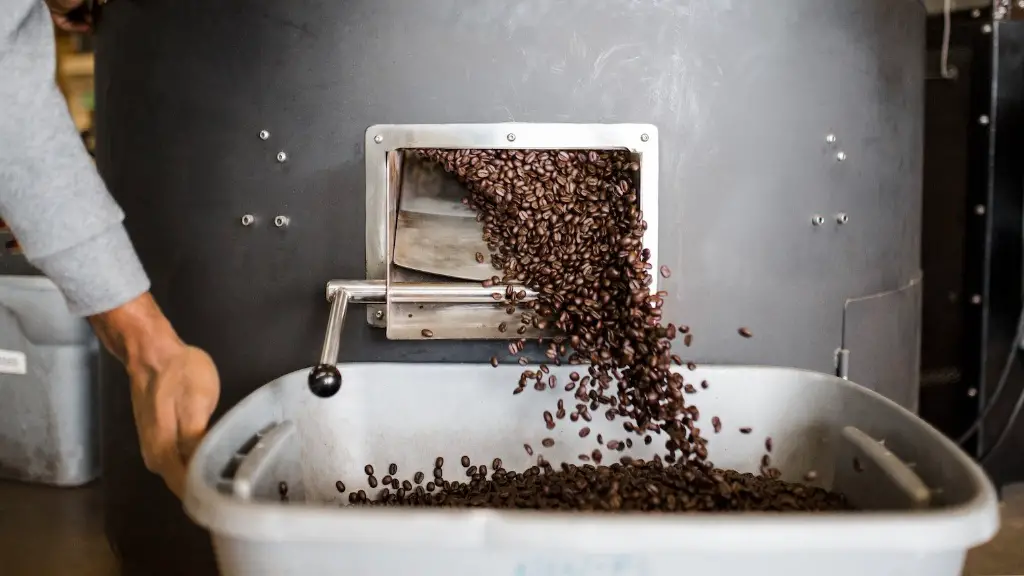Coffee is an essential part of modern life and it’s no wonder that some mothers may be tempted to have a cup while breastfeeding. But is it really safe? Is there a better time? And what should mothers consider when making their decision? Let’s explore further.
Coffee is a physiological stimulant and as such contains caffeine. Too much caffeine can be harmful to a breastfed baby and this is something mothers need to be aware of. Also, while small amounts of caffeine are considered safe, its impact varies from baby to baby. The American Academy of Pediatrics recommends that breastfeeding mothers limit their caffeine intake to no more than 2-3 caffeinated beverages per day, including coffee. They also recommend that mothers avoid consuming caffeine before feeding the baby.
Several studies have shown that when consumed in moderation, coffee does not seem to adversely affect a baby’s growth or health. For example, a 2018 study published in the journal Pediatrics showed that mothers who consumed up to 300 milligrams of caffeine each day had infants with normal growth and development.
The best time to drink coffee when breastfeeding is probably during the day after your baby has had their feed. Caffeine has a half-life of around four to six hours, meaning that the effects on the baby can last up to twelve hours after the last cup was consumed. This means that the baby should be able to sleep through the night without any disturbances due to the caffeine.
Drinking coffee while breastfeeding also carries other risks. As it is a diuretic, it can lead to dehydration and milk supply problems as well as decrease the production of oxytocin, a hormone that helps with milk letdown. Too much caffeine can also cause irritability and restlessness in babies.
Experts agree that mothers should talk to their pediatrician about their coffee consumption if they are breastfeeding and make sure to monitor their baby for any signs of discomfort and excessive fussiness. Mothers can also try drinking decaffeinated coffee to minimize the risk.
Ultimately, it is up to the mother to decide when to drink coffee while breastfeeding. The most important thing is to monitor your baby’s behavior and watch for any adverse reactions, such as irritability and fussiness. If you are concerned about the effects of coffee on your baby, talk to your doctor and consider cutting down on or stopping coffee altogether.
What is caffeine?
Caffeine is a naturally-occurring stimulant found in a variety of foods and beverages, including coffee, tea, and chocolate. It is also found in some medicines, energy drinks, and dietary supplements. Caffeine can have both positive and negative effects on people, depending on the amount consumed. In moderate doses, caffeine can improve alertness, reaction time, and focus but too much can cause jitters, irritability, and insomnia.
Caffeine can enter a mother’s milk supply, and this is something breastfeeding mothers should be aware of. In small amounts, caffeine does not appear to have any adverse effects on babies in terms of growth or development. However, too much can be harmful and can cause irritability, restlessness, and even colic.
Caffeine has a half-life of four to six hours, meaning that the effects of a cup of coffee can last up to twelve hours. This means that if a mother has a cup of coffee before bed, the effects could still be present when the baby wakes up and might interfere with their sleep. For this reason, it is generally recommended that coffee is avoided in the late evening.
In conclusion, when consumed in moderation, caffeine does not seem to affect a baby’s growth or health. However, it is important to monitor your baby for any signs of discomfort and excessive fussiness, and to talk to your doctor if you are concerned about caffeine’s effects.
What are the dangers of too much caffeine?
Caffeine is a stimulant and can have both beneficial and harmful effects depending on the amount consumed. Large doses of caffeine can cause jitteriness, restlessness, insomnia, and even colic in babies. It can also lead to dehydration and reduce milk supply in the nursing mother. Caffeine can also affect the production of oxytocin, a hormone that helps with milk letdown, which can interfere with breastfeeding.
When consumed in moderation, caffeine does not appear to have any adverse effects on babies in terms of growth or health. However, mothers should be aware of the potential risks and should talk to their pediatrician before consuming caffeine while breastfeeding. They should also monitor their baby for any signs of discomfort and excessive fussiness.
If mothers are worried about the effects of caffeine, they can try switching to decaffeinated coffee and teas, or cutting back on caffeine consumption. But it is important to remember that caffeine is not completely eliminated from decaffeinated drinks and that even small amounts can affect a baby’s sleep and behavior.
In conclusion, mothers should be mindful of their caffeine consumption and consider the potential effects on the baby when deciding when to drink coffee or other caffeinated beverages. They should also talk to their doctor if they are concerned and monitor their baby for any changes in behavior.
How can I decrease my caffeine consumption while breastfeeding?
Decreasing caffeine consumption while breastfeeding is one way mothers can ensure their baby’s safety. There are a few simple steps mothers can take to decrease their caffeine intake. Firstly, they can switch to decaf versions of their favorite drinks. Secondly, they can make healthier choices – like green tea or herbal tea – instead of coffee. Thirdly, they can avoid drinks that contain caffeine such as sodas, certain juices and energy drinks.
Another important step mothers can take is to avoid late-night caffeine consumption. Caffeine has a half-life of four to six hours, meaning it can stay in your system for up to twelve hours, potentially interfering with your baby’s sleep. For this reason, it is best to restrict caffeine consumption to earlier in the day and limit it to one to two cups of coffee at most.
It is also important to remember that caffeine can be hiding in unexpected places. Some foods, such as chocolate and ice cream, can have high levels of caffeine, so it’s important to read the labels and avoid them if necessary. Also, be mindful of the medications you take, as some cold and flu medicines, headache tablets, and energy supplements contain caffeine.
In conclusion, mothers can take some simple steps to decrease their caffeine intake while breastfeeding. These include switching to decaf versions of drinks, avoiding late-night caffeine consumption, and avoiding hidden sources of caffeine. However, if mothers are still concerned, they should talk to their doctor and consider cutting down on or stopping caffeine altogether.
What are the benefits of caffeine while breastfeeding?
Some studies suggest that there may be some benefits to drinking caffeine while breastfeeding. Caffeine has been found to increase alertness, reaction time, and focus in mothers, which may be beneficial for some mums. Also, it can stimulate milk supply in mothers and can help with postpartum fatigue.
However, it is important to remember that caffeine is a stimulant and can have some potential risks for the baby. Therefore mothers should always be aware of the potential risks and take steps to minimize them. These include limiting their daily caffeine intake, avoiding late-night caffeine consumption, and monitoring their baby for any signs of discomfort or excessive fussiness.
In conclusion, there may be some benefits to drinking caffeine while breastfeeding. However, mothers should be mindful of the potential risks and take steps to minimize them. If they are still concerned, they should talk to their doctor and consider cutting down on or stopping caffeine altogether.
Tips for drinking coffee while breastfeeding
If mothers decide to drink coffee while breastfeeding, there are some simple tips they can follow to ensure their baby’s safety. Firstly, they should limit their daily caffeine intake to no more than two to three caffeinated drinks per day. Secondly, they should avoid late-night consumption and try to drink coffee during the day after their baby has had their feed. Thirdly, they should make sure to monitor their baby for any signs of discomfort or excessive fussiness.
It is also important to be mindful of hidden sources of caffeine. Some foods and medications contain caffeine, so mothers should read labels and avoid them if necessary. And finally, if mothers are still concerned about the effects of coffee on their baby, they can try switching to decaffeinated coffee and teas, or cutting back on their coffee consumption.
In conclusion, mothers should be aware of the potential risks of caffeine when breastfeeding and take steps to minimize them. They should limit their daily caffeine intake, avoid late-night consumption, monitor their baby for any changes in behavior, and be mindful of hidden sources of caffeine. If they are still concerned, they can talk to their doctor and consider cutting down on or stopping coffee altogether.





